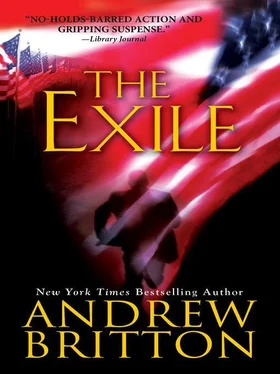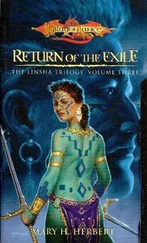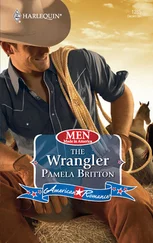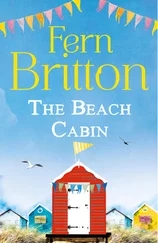Andrew Britton - The Exile
Здесь есть возможность читать онлайн «Andrew Britton - The Exile» весь текст электронной книги совершенно бесплатно (целиком полную версию без сокращений). В некоторых случаях можно слушать аудио, скачать через торрент в формате fb2 и присутствует краткое содержание. Жанр: Триллер, на английском языке. Описание произведения, (предисловие) а так же отзывы посетителей доступны на портале библиотеки ЛибКат.
- Название:The Exile
- Автор:
- Жанр:
- Год:неизвестен
- ISBN:нет данных
- Рейтинг книги:5 / 5. Голосов: 1
-
Избранное:Добавить в избранное
- Отзывы:
-
Ваша оценка:
- 100
- 1
- 2
- 3
- 4
- 5
The Exile: краткое содержание, описание и аннотация
Предлагаем к чтению аннотацию, описание, краткое содержание или предисловие (зависит от того, что написал сам автор книги «The Exile»). Если вы не нашли необходимую информацию о книге — напишите в комментариях, мы постараемся отыскать её.
The Exile — читать онлайн бесплатно полную книгу (весь текст) целиком
Ниже представлен текст книги, разбитый по страницам. Система сохранения места последней прочитанной страницы, позволяет с удобством читать онлайн бесплатно книгу «The Exile», без необходимости каждый раз заново искать на чём Вы остановились. Поставьте закладку, и сможете в любой момент перейти на страницу, на которой закончили чтение.
Интервал:
Закладка:
“Then the next day is when it has to be,” White said.
Another silence. Nusairi watched the shadows hurled off by the lamp’s burning wick cavort across the rough brown walls of the brick house.
“Mirghani went out of his way to mention our rendezvous,” he said. “I think we should go through with it. As if we haven’t yet met.”
“A setup?”
“Yes,” Nusairi said. “Clearly a net has been cast.”
White sat for a moment, nodded.
“We’ll have to see who gets snagged,” he said.
CHAPTER 21
SUDAN
Enriched by the fertile soil of the Gash River delta, Kassala was known for the fruit groves and grape fields spread out for miles around the city proper, where its low, flat-roofed homes were laid out in a rectangle around a spacious open-air souq. There the crops were brought by donkey, truck, and camel train and sold from dawn to dusk, the citrus fruits, mangoes, pomegranates, and melons arranged around the market’s ruler-straight borders, where they overflowed their baskets among the woven goods of Beja artisans and the silver bracelets, necklaces, and charms crafted by women of Rashaida origin.
The prevailing religion in Kassala was Islam; the ethnic mix varied. Brown jute waistcoats over their long white robes, turbans wrapped around their taqiyahs, steel longswords at their waists, and wooden boomerangs across their backs, the Beja clansmen, who composed the majority of the village’s population, would often mill about the souq to trade for the superior livestock of the more colorfully dressed Rashaida nomads, whose sheep and goats were herded on seasonal migrations between the village and the Eritrean lowlands.
Kealey, Abby, and Mackenzie had driven from Khartoum in the crepuscular gloom before sunrise, Mackenzie at the wheel of the Jeep, their route following the main road out of the city southeast along the Blue Nile to Wad Medani, then turning due east across 150 miles of irrigated grain fields and parched sandy expanses to Gedaref, where the terrain gradually transitioned to rolling green hills.
Mackenzie drove mostly in dour silence. Just the day before he had helped lift the bloody remains of Jacoby Phillips from the rear section of the very Cherokee that he was now navigating toward Kassala. He and Phillips had been pretty good friends. They had often exchanged war stories-Mackenzie sharing some of his exploits in Afghanistan, Phillips speaking of his time disrupting Saddam’s communications infrastructure in the Persian Gulf. They had talked, on occasion, of getting together when they finished with their hitches in Sudan. Mackenzie, who’d inherited a family home on the Tennessee River at the Kentucky border, had told Phillips of the catfish traps they would lay in the morning from his outboard, and had explained how they would go out on the boat that same evening and bring in a haul for the community fish fry. Phillips had laughed about it. Community fry? We can catch that many fish in a single day? Mackenzie had explained you didn’t need to, not if you brought along plenty of bourbon to keep everyone happy.
The trio inside the Cherokee rolled on through the sunrise and early morning. By full daylight the uneven macadam beneath their tires had swung back north into flat plains and desert, clinging to the old British railway tracks near the Ethiopian and Eritrean borders as it took them first to the little village of Shobak, then under the loom of the twisted, humped Taka Mountains.
They had not been concerned with military checkpoints. Nor would they have to be as they neared their destination. The U.S. secretary of state and the foreign minister of Sudan had had a back-channel chat during the night and had arranged for a subsequent top secret conversation between their respective presidents. And when Omar al-Bashir and David Brenneman had spoken, Brenneman had advised Bashir of intelligence he’d received that vindicated him as far as having staged the assault on Camp Hadith and the murder of Lily Durant. While vague on many details, he had made it unequivocally clear that the United States, and indeed the world, had been deceived by subversive elements within Sudan who had planned to undermine the Bashir government, seeing that it was held responsible for the blatant atrocities committed against Camp Hadith’s starved, sick refugees and the U.S. president’s beloved niece. Finally, Brenneman had suggested that their mutual cooperation in bringing the conspirators to justice could lead to more than just a temporary thaw in relations between the two nations, but perhaps to a relaxing of trade embargoes and other long-term improvements in their relationship-including a U.S. reevaluation of its stance on Bashir’s international criminal status. And naturally Bashir had jumped at the deal.
Kealey hated that his government was now accommodating one bloody monster in order to stop another that it had given fangs and claws. He hated the facile blurring of moral lines and, most of all, hated feeling that he was being used as a pawn in a dirty political game.
But he had gotten involved with the Agency again for one and only one reason. For him it began and ended with the photograph that John Harper had shown him in that Pretoria bar, the snapshot of a plain, dark-haired woman in her midtwenties, an aid worker surrounded by starved-looking African children, her infectious smile somehow managing to catch hold on their gaunt, hollow-eyed faces.
He wanted the man who killed Lily Durant. He wanted him more now than ever. Call it justice; call it revenge; it didn’t matter. He could taste his desire for it at the back of his tongue, as he had tasted it every moment since he’d seen that picture…
And it was bitter. Unbearably bitter.
“That’s Jebel Atweila, about a mile east of us,” Mackenzie said. He pointed out the right side of his windshield. After passing through the main checkpoint into Kassala, he had crossed the Gash River over the bridge spanning its narrows and looped around the eastern edge of town, leaving the rutted blacktop behind for dirt and gravel tracks, then swinging completely off road toward the heaving escarpments. “The other two mountains are Taka and Totil.”
Kealey looked at his chronograph. “Almost noon,” he said. “Mirghani’s people should be there about now.”
Mackenzie steered toward Atweila and was soon bumping over the pebbly deposits spread out around the slope, glancing repeatedly at his GPS unit to check his coordinates against those that had been preset for their meet. Sticking close to the base of Atweila, he continued around it until he spotted a rock-strewn switchback in the shadow of a large, anvil-shaped spur. When he got there, he swung onto it, twisted up the mountain for about 50 yards, jounced to a halt, and cut the ignition.
Kealey glanced around at their surroundings, reached for his door handle, and got out, Mackenzie and Abby exiting with him. Seth Holland’s Glock 35 was in a sidearm holster under his Windbreaker, which also concealed the Muela combat blade he’d bought back in Yaounde and carried in a sheath at his waist.
They had hiked 30 or 40 feet up along the switchback, taking several winding turns, when a group of fighters appeared from behind a knobby granite outcrop…almost all of them in khakis, head scarves, and combat boots, standing openly in the baking sun. All had rifles on their shoulders-M14s, AK-47s, Steyr and FAMAS bullpups.
Kealey and his companions stopped, waited as a wiry man with a short, dark beard on his tanned face approached.
“ A s’amaa zarqaa, ” Mackenzie said.
The bearded man gave his response to the code phrase. “Wa quul id-diir.”
They shook hands, had a brief exchange in Arabic. Then Mackenzie turned to Kealey. “This is Tariq…Ishmael Mirghani’s second in command,” he said, making their introductions. “Tariq, Ryan Kealey. And Abby Liu.”
Читать дальшеИнтервал:
Закладка:
Похожие книги на «The Exile»
Представляем Вашему вниманию похожие книги на «The Exile» списком для выбора. Мы отобрали схожую по названию и смыслу литературу в надежде предоставить читателям больше вариантов отыскать новые, интересные, ещё непрочитанные произведения.
Обсуждение, отзывы о книге «The Exile» и просто собственные мнения читателей. Оставьте ваши комментарии, напишите, что Вы думаете о произведении, его смысле или главных героях. Укажите что конкретно понравилось, а что нет, и почему Вы так считаете.










